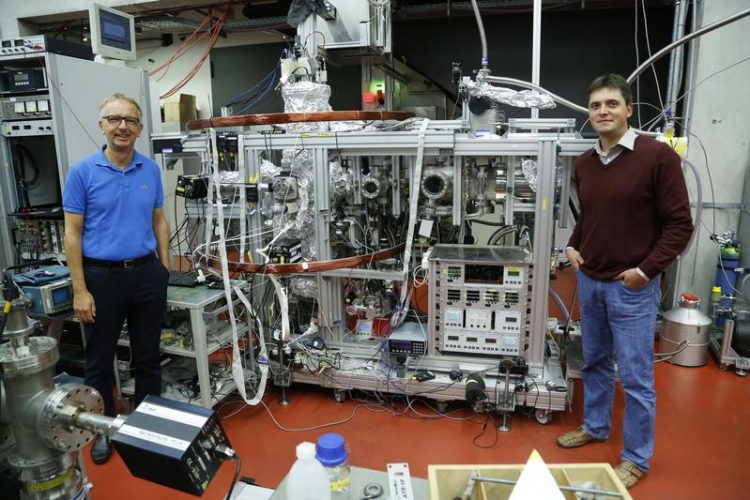Award for ground-breaking measuring methods

Prof. Reinhard Dörner (left) and Maksim Kunitski in front of the equipment used to complete the outstanding work. GU
This year the most important award in the field of metrology, the science of making precise measurements, was awarded to a team of five Frankfurt atomic physicists at Goethe University: Prof. Reinhard Dörner, Associate Prof. Dr. Till Jahnke, Dr. Maksim Kunitzki, Dr. Jörg Voigtsberger and Stefan Zeller. The Helmholtz award includes an endowment of Euro 20,000 and is awarded to European researchers every three years.
The award recipients succeeded in measuring the extremely weak binding energy of helium molecules with a previously unachievable precision. Chemistry teaches us that helium as a noble gas doesn't form bonds. However, this becomes possible under certain circumstances predicted by quantum theory.
The study group under Dörner has measured this binding energy indirectly with the COLTRIMS reaction microscope developed at Goethe University. It can be used to measure the location and speed of decaying molecules at the same time with a high level of accuracy, and this data can be used to reconstruct the original configuration. The award winners focused on rare molecules composed of two or three helium atoms.
“It started with the German Research Foundation approving me for a Koselleck project with funding of over 1.25 million in 2009. This is a kind of venture capital, which the DFG uses to support experiments with a long lead time”, Prof. Reinhard Dörner from the Institute for Nuclear Physics explains.
Dr. Till Jahnke laid the foundation for the equipment, then doctoral candidate Jörg Voigtsberger took over the experiment and achieved initial successes. The next doctoral candidate, Stefan Zeller, was able to make significant improvements to the equipment and to further increase the precision.
To do so, he had to direct the largest “photon canon” in Germany, the “Free Electron Laser FLASH” at the DESY research centre in Hamburg, at the extremely weakly bonded helium molecules. In this way he was able to determine the binding energy with a precision of a few nano-electron volts. This means that the binding energy of the helium molecules is one-hundred million times weaker than in a water molecule, for example.
The series of experiments culminated this past year with the dicovery of the so-called Efimov state for a helium molecule made up of three atoms. This comparatively huge molecule predicted 40 years ago by the Russian theorist Vitaly Efimov, can only exist in the tunnel effect established by quantum physics. The postdoc Maksim Kunitzki succeeded in making this measurement with the same equipment.
“All Helmholtz Award winners to date have significantly advanced the art of measuring and many of them are among the most renowned researchers in the field of metrology today”, said Dr. Joachim Ullrich, President of the National Metrology Institute of Germany (PTB) and Chairman of the Helmholtz Fund.
“We are confident that this will also hold true this time.” Researchers at the University of Cambridge are also distinguished with the Helmholtz Award for their method of measuring individual molecules using nano-pores, a proven method in DNA analysis. They have created a method for theoretically detecting any number of different protein molecules in the same measurement. The award will be presented on 22 June 2016 in the conference centre of the National Metrology Institute of Germany (PTB).
The Frankfurt award winners have already received several other rewards for their work: In 2013 Till Jahnke was awarded the most important young scientist award of the Deutsche Physikalische Gesellschaft, the Gustav Hertz Award. The following year, Reinhard Dörner was distinguished with the renowned Robert Wichard Pohl Award by the Deutsche Physikalische Gesellschaft. In 2015, Maksim Kunitski received an award from the “Frankfurter Förderverein für physikalische Grundlagenforschung”.
Information: Prof. Reinhard Dörner, Institut für Kernphysik, Max-von-Laue-Str. 1, Tel: (069) 798-47003, doerner@atom.uni-frankfurt.de
Goethe University is a research-oriented university in the European financial centre Frankfurt founded in 1914 with purely private funds by liberally-oriented Frankfurt citizens. It is dedicated to research and education under the motto “Science for Society” and to this day continues to function as a “citizens’ university”.
Many of the early benefactors were Jewish. Over the past 100 years, Goethe University has done pioneering work in the social and sociological sciences, chemistry, quantum physics, brain research and labour law. It gained a unique level of autonomy on 1 January 2008 by returning to its historic roots as a privately funded university. Today, it is among the top ten in external funding and among the top three largest universities in Germany, with three clusters of excellence in medicine, life sciences and the humanities.
Publisher: The President of Goethe University
Editor: Dr. Anke Sauter, Science Editor, International Communication, Tel: +49(0)69 798-12477, Fax +49(0)69 798-761 12531, sauter@pvw.uni-frankfurt.de
Internet: www.uni-frankfurt.de
Media Contact
All latest news from the category: Awards Funding
Newest articles

Properties of new materials for microchips
… can now be measured well. Reseachers of Delft University of Technology demonstrated measuring performance properties of ultrathin silicon membranes. Making ever smaller and more powerful chips requires new ultrathin…

Floating solar’s potential
… to support sustainable development by addressing climate, water, and energy goals holistically. A new study published this week in Nature Energy raises the potential for floating solar photovoltaics (FPV)…

Skyrmions move at record speeds
… a step towards the computing of the future. An international research team led by scientists from the CNRS1 has discovered that the magnetic nanobubbles2 known as skyrmions can be…





















